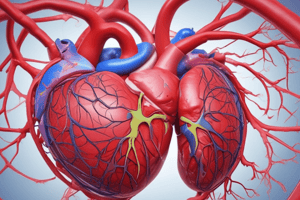Podcast
Questions and Answers
Which cardiac structure is supplied predominantly by the left coronary artery?
Which cardiac structure is supplied predominantly by the left coronary artery?
- Right atrium
- Left atrium (correct)
- Right ventricle
- Diaphragmatic surface of left ventricle
What is a characteristic of coronary arteries?
What is a characteristic of coronary arteries?
- They are considered functional end arteries. (correct)
- They contain numerous anastomoses for quick recovery.
- They are not functional end arteries.
- They effectively supply the heart during rapid occlusions.
What is the primary consequence of blockages in the coronary arteries?
What is the primary consequence of blockages in the coronary arteries?
- Increased oxygen supply to cardiac muscle
- Enhanced muscle endurance
- Improved blood pumping efficiency
- Tissue death due to lack of oxygen (correct)
Which structure is primarily responsible for initiating electrical impulses in the heart?
Which structure is primarily responsible for initiating electrical impulses in the heart?
In the context of myocardial infarctions, what causes tissue death?
In the context of myocardial infarctions, what causes tissue death?
Which branch of the right coronary artery is responsible for supplying blood to the posterior interventricular septum?
Which branch of the right coronary artery is responsible for supplying blood to the posterior interventricular septum?
What is the main purpose of angioplasty?
What is the main purpose of angioplasty?
What is one consequence of chronic blockages in the coronary arteries?
What is one consequence of chronic blockages in the coronary arteries?
Which layer of the heart is primarily affected by coronary heart disease?
Which layer of the heart is primarily affected by coronary heart disease?
How is venous drainage from the heart primarily accomplished?
How is venous drainage from the heart primarily accomplished?
What is the primary role of the sinoatrial (SA) node in the heart?
What is the primary role of the sinoatrial (SA) node in the heart?
What happens to the heart's rhythm if there is damage to the atrioventricular (AV) node?
What happens to the heart's rhythm if there is damage to the atrioventricular (AV) node?
Which structure is responsible for carrying the electrical impulse from the AV node to the ventricles?
Which structure is responsible for carrying the electrical impulse from the AV node to the ventricles?
What is the function of Purkinje fibres in the heart?
What is the function of Purkinje fibres in the heart?
Heart block can occur when there is a blockage in which of the following regions?
Heart block can occur when there is a blockage in which of the following regions?
What is a common treatment for heart block resulting from AV node damage?
What is a common treatment for heart block resulting from AV node damage?
What structure conducts the electrical impulse after the left bundle branch?
What structure conducts the electrical impulse after the left bundle branch?
Which statement about the intrinsic pacemaker system of the heart is true?
Which statement about the intrinsic pacemaker system of the heart is true?
What is the effect of a pacemaker on the heart?
What is the effect of a pacemaker on the heart?
Which anatomical structure is directly involved in the conduction of the heart rhythm?
Which anatomical structure is directly involved in the conduction of the heart rhythm?
Study Notes
Coronary Circulation
- Right coronary artery is dominant and supplies the right atrium and ventricle. It crosses over the interventricular septum and gives off the posterior interventricular artery.
- Left coronary artery predominantly supplies the left atrium and most of the left ventricle; it also supplies some parts of the right ventricle.
- Coronary arteries function as "functional" end arteries; anastomoses are present but primarily effective in slow occlusions.
- Sudden blockages in coronary arteries can lead to myocardial infarction due to the lack of oxygen reaching the cardiac muscle.
Coronary Heart Disease
- Blockages in coronary arteries prevent oxygen from reaching cardiac muscle, resulting in tissue death.
- Tissue death can cause angina (pain) and ineffective pumping of blood.
Angiography and Treatment
- Angiography is used to visualize blockages in coronary arteries.
- Angioplasty is often performed to open blocked arteries via balloon expansion.
- Coronary bypass surgery may be necessary, particularly in cases of severe blockage.
Venous Drainage of Heart
- Cardiac veins drain the right atrium; major vessels include the coronary sinus, which opens into the right atrium.
- Key veins involved in venous drainage include the great cardiac vein, middle cardiac vein, small cardiac vein, and left marginal vein.
Conductive System of the Heart
- Sinoatrial (SA) node acts as the intrinsic pacemaker with a rhythm of approximately 70 beats per minute.
- Atrioventricular (AV) node can also pace independently and conducts impulses to the ventricles.
- The Atrioventricular bundle (Bundle of His) transmits impulses into the left and right bundle branches.
Heart Block
- Heart block may occur if there is damage to the coronary vessels supplying the SA or AV nodes, leading to asynchronous heartbeats.
- AV node damage specifically causes a heart block, hindering communication from the SA node to the ventricles.
- Pacemaker devices can be implanted to electrically stimulate ventricular muscle when natural pacing is disrupted.
Studying That Suits You
Use AI to generate personalized quizzes and flashcards to suit your learning preferences.
Related Documents
Description
Explore the key concepts of coronary circulation, heart disease, and their implications on cardiac health. This quiz covers the anatomy of coronary arteries, the effects of blockages, and medical interventions like angiography and angioplasty.




